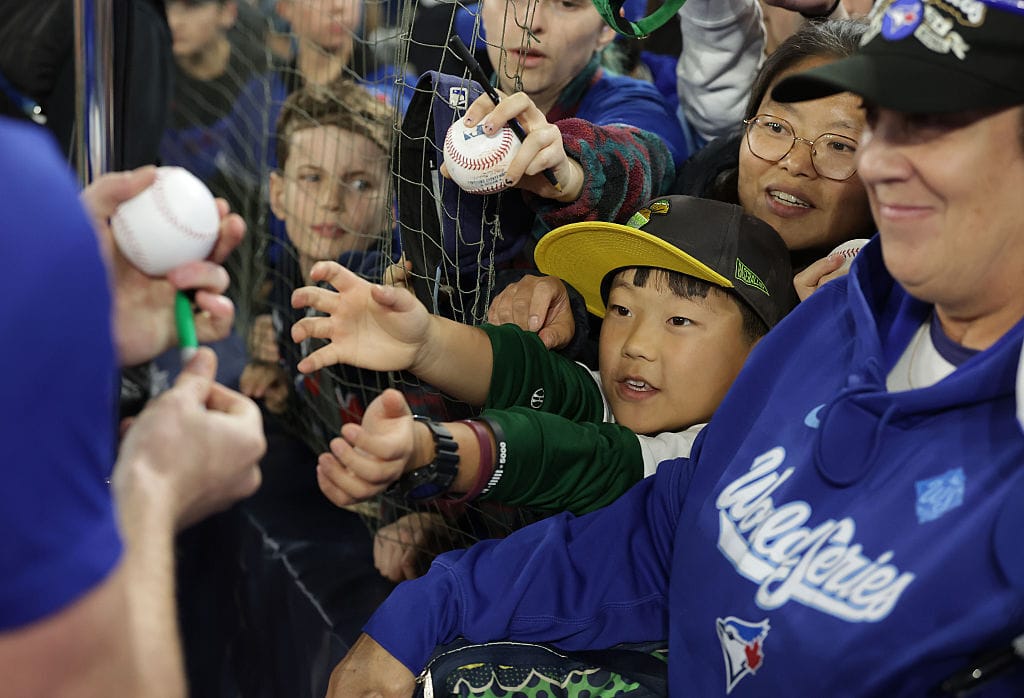
When I asked Brilliant Readers to send in a line about why they love baseball, I did not expect the absolute torrent of poetry, memory and joy that has poured in over the last few days. We have received, I kid you not, THOUSANDS of reasons why you love baseball.
And they keep coming in, seemingly dozens every hour.
I hope they pour in all offseason (You can send yours in to [email protected]).
So here’s what I’m going to do — every post throughout the long offseason, I’m going to share with you reasons why we love baseball. Some days it might be three or four thoughts. Some days it will be just one. Each day will revolve around a theme.
Our whole goal here at JoeBlogs, as you know, is to brighten your day. Going through all these reasons why you love baseball has made me laugh, smile, and warmed my heart — the last is of particular value as we just had our first overnight frost.
I hope these do the same for you over the next 91 days, 14 hours, 53 minutes and 26 seconds until pitchers and catchers report.
Today, Brilliant Readers talk about passing the game along from generation to generation:
Why do you love baseball?
Brilliant Reader Dan: “You see a kid, especially your own kid, get an autograph or a ball and you think, ‘I wish, I wish,’ but you don’t really because you see the excitement in that kid and it kind of becomes your excitement.”
Brilliant Reader Debbie: “The times shared with our parents, our children and our framily of fans. In happy times and, especially, in troubling times, it is so comforting to have baseball.”
Brilliant Reader Adam: “The joy (and surprise) on your kid’s face the first time they catch a fly ball in little league.”
Today’s post is free for everyone, thanks to our Brilliant Readers in The Clubhouse — our joyful little corner of the sports world.
Tomorrow, I’ll be sharing some big news about the future of JoeBlogs and The Clubhouse — I’m really excited about it and have been planning it for months.
But if you’d like to peek inside now, you’re always welcome.
RIP Lenny Wilkens
We lost two sporting giants on Sunday, and they both played important roles in my life.
Lenny Wilkens is in the Basketball Hall of Fame THREE times:
Once as a player (he was a nine-time All-Star and finished second to Wilt Chamberlain in the 1967-68 MVP race).
Once as a coach (he won more than 1,300 games as a coach, and coached the 1978-79 SuperSonics to the title).
Once as part of the original Dream Team (he was an assistant coach).
When I was 21 years old, and still in college, I worked as an agate clerk for The Charlotte Observer — one of my main jobs was updating the standings throughout the night as games came in. While doing this, I couldn’t help but notice that NBA teams were KILLING IT at home. Their home records were so much better than those of NFL, MLB, and NHL teams. I thought that might make for an interesting story.
“Go ahead and write it,” our sports editor and my mentor, Gary Schwab, suggested (though, as I recall, he did say for me to do it on my own time).
Well, I didn’t have any idea how to write a big story like that. No clue. I asked a couple of the real reporters at the paper, and they said, “Why don’t you start by talking to some coaches?” That seemed a great idea, but I honestly didn’t know how to do that either.
Eventually, I found a Cleveland Cavaliers media guide and summoned the courage to call the team. My plan was to try and explain my story and see if there might be any possible way to convince someone to let me talk to Lenny Wilkens.
Someone answered the phone: “Cleveland Cavaliers.” I then spent the next six minutes telling this very nice receptionist my full idea — complete with stats, if I remember — at which point she said, “Let me transfer you to our media relations department.”
A man answered, and I went through the whole spiel AGAIN in the panicked voice of a 21-year-old who has no idea what he’s doing, only this guy cut me off in the middle and said, “Hold on a second.” I was on hold thinking, “Oh, he’s never coming back.”
The next voice I heard was, “Hello, this is Lenny Wilkens.”
What I remember most is how kind he was. I wasn’t prepared to interview him at all — I thought his would be, like, a six-month process — but he walked me through it, told me it was a very good idea, and encouraged me to call other coaches. It was one of the greatest journalism lessons I’ve ever received.
I saw Lenny again a few times over the years — such as when he passed Red Auerbach as the all-time leader in wins — and I once even told him this story. He had no memory of it, of course, but he laughed and said that nobody ever wanted to talk to him as badly as I did.
RIP Paul Tagliabue
About a year ago, I did a WHY WE LOVE FOOTBALL event with Paul Tagliabue at the Smithsonian. He gave me his copy of his autobiography, “Jersey City to America’s Game” — with some of Paul’s personal notes in it — and asked me to read it. I got the impression that he really wanted to know what I thought of his time as commissioner.
I did read it, but I never got the chance to tell him this: I think Paul Tagliabue was the best thing you can be as a commissioner of a sport. I think he was a good man. I don’t mean to say that I think everything he did was right (obviously, not — the Cleveland Browns moved to Baltimore on his watch) or that he fought all the right fights.
But he deeply loved football, never looked for credit, and was willing to fight for the integrity of the league. After Hurricane Katrina, Saints owner Tom Benson saw a chance to move the team to San Antonio, where he lived. Tagliabue wouldn’t hear of it. “There’s not a chance in hell you’ll prevail,” he told Benson’s lawyer.
And when the Saints played again in New Orleans, he deflected all the praise to the new commissioner, Roger Goodell.
The concept of a sports commissioner is a sound one, I think — having someone at the top who is beholden to nobody but the fans and the sport would be ideal. Unfortunately, that’s not how it works. Commissioners now work for the owners; they threaten the players; they chase today’s dollar to the exclusion of all else. Paul Tagliabue wasn’t perfect, but he did try to build on the NFL’s integrity. There might not be another commissioner like him again.
I’m shocked — shocked — to find gambling in this establishment
I started off my Sunday sports-watching with a plan to count how many times I would be encouraged to gamble on sports … I lost count (and interest) after the 25th bit of coercion. This came a couple of hours BEFORE the 1 p.m. kickoff.
We all intuitively know how ever-present the gambling pressures are — but if you ever stop to really notice the commercials, the references, the pregame shows and broadcasts, the signs everywhere, the advertisements online, the notifications on your phone, the offers on your favorite podcasts, it is actually quite shocking. There are very, very few gambling-free minutes in a sports fan's life these days.
Even here at JoeBlogs, we’ve had many offers to make good money by promoting gambling. I’ll talk about that more tomorrow when I make a big announcement about where JoeBlogs is heading.
My point is that when you really step back and see how thoroughly the gambling world has taken over sports — and given us all this extra hunger for a little more action — you can only shrug your shoulders when you see a story like the one that broke on Sunday in Cleveland. Guardians relievers Emmanuel Clase and Luis Ortiz were indicted for attempting to rig pitches during a game. What is “rigging pitches?” People bet on everything in sports now, including balls and strikes. Apparently, Clase and Ortiz worked out with gamblers which pitches they would purposely throw as balls.
Apparently, gamblers made hundreds of thousands of dollars on this scheme.
I mean, did anyone doubt that something like this was coming?
Does anyone think this will be the last of it?
MLB’s statement might as well have come from Captain Renault himself: “MLB contacted federal law enforcement at the outset of its investigation and has fully cooperated throughout the process. We are aware of the indictment and today's arrest, and our investigation is ongoing."
They’re cooperating! They’re aware! Their investigation is ongoing!
Nothing to see here.
More and more players tell me how the gambling revolution has impacted their lives. They get threats. They get verbally abused. Their families hear from betting losers. It’s constant. It gets louder every day.
And the leagues that should protect them — the leagues that EXIST to protect them both because it’s the right thing to do and because this cuts to the very heart of sports trustworthiness and legitimacy — have surrendered to money instead.
It’s heartbreaking. And it’s only going to get worse.

